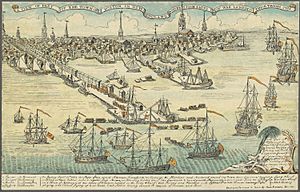Massachusetts Circular Letter facts for kids

The Massachusetts Circular Letter was an important message written by Samuel Adams and James Otis Jr. in 1768. It was approved by the Massachusetts government. This letter was a response to new taxes from Britain called the Townshend Acts. The letter caused big problems between the British government and Massachusetts. It even led to British soldiers taking over Boston. This event helped start the American Revolution.
Why the Letter Was Written
After the Stamp Act was canceled in 1766, the British government (called Parliament) needed more money. So, in 1767, they created the Townshend Acts. These acts put taxes on things like glass, paint, paper, lead, and tea that were brought into the colonies. They also set up a new customs office in America.
In response, the Massachusetts government wrote the Circular Letter. A "circular letter" is a message meant to be sent to many people or groups. The Massachusetts Circular Letter was sent to the governments of the other colonies. Colonies like New Jersey, Connecticut, and Virginia sent back positive replies.
What the Letter Said
In the Circular Letter, Samuel Adams argued that the Townshend Acts were unfair. He said they were "unconstitutional." This meant they went against the basic rules of how the government should work. Adams believed that because Massachusetts had no representatives in the British Parliament, Parliament could not tax them.
Adams explained that even though Parliament was the main law-making body of the British Empire, it still had to follow the rules of the British Constitution. He also said it could not take away the colonists' natural rights. Adams was clear that he did not want the colonies to send representatives to Parliament. He thought it was not practical because the American Colonies were "separated by an ocean of a thousand leagues" from Great Britain.
Instead, Adams wanted things to go back to how they were before. He believed that the colonies should only be taxed by their own local governments. These local governments already had representatives from the colonists.
What Happened Next
After the Circular Letter was sent out, a British official named Lord Hillsborough ordered the Massachusetts government to take it back. But the Massachusetts government voted 92 to 17 to keep the letter.
Because of this, Governor Francis Bernard closed down the Massachusetts assembly. This made many colonists very angry. They felt they had no legal way to express their complaints. Some angry colonists attacked tax officials. This made it impossible for the officials to do their jobs.
To deal with the growing problems, Lord Hillsborough sent four groups of British soldiers to Boston. When the soldiers arrived in October 1768, they made things even more tense. An anonymous journal called the "Journal of Occurrences" wrote about the soldiers' presence. These tensions eventually led to the Boston Massacre on March 5, 1770.

